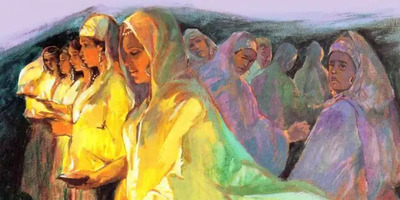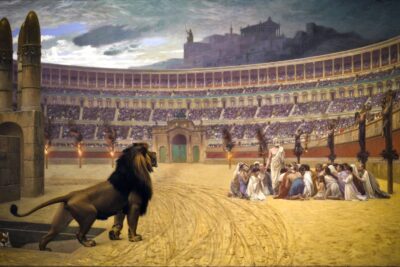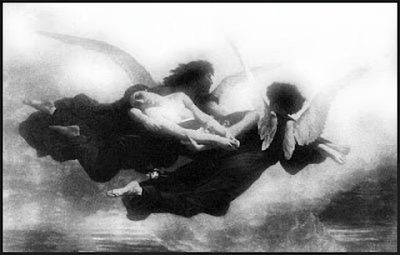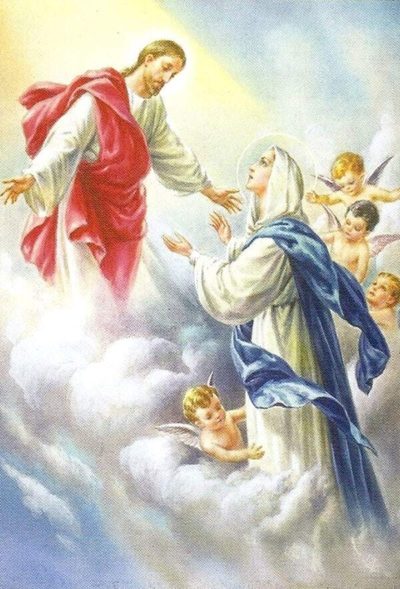April 9, 2023
|by N W
|
0 Comments
|
Comfort, Easter, Evangelization, Guest Celebrants, Heaven, Resurrection
The Resurrection of the Lord
April 9, 2023 – Year A
Readings: Acts 10:34a, 37-43 / Ps 118 / Col 3:1-4 / Jn 20:1-9
by Rev. Jay Biber, Guest Celebrant
Today’s gospel has a great theme, in this season that introduces death to life, light to darkness, good and evil. It goes back to the two great dimensions of what God gives us, and I think I’d like to leave you with the same homework assignment that I left with the folks at the Easter Vigil last night.
These two dimensions of God that we focus on, that come front and center when we celebrate the sacrament of Baptism, are the dimension of God as creator and God as redeemer. We call these the Two Orders – the order of creation and the order of redemption.
At the Vigil Mass, we begin a long series of readings beginning with the creation account from the very first pages of the Book of Genesis. God creates the world, the sky on Day One, the seas and the waters on Day Two, the earth on Day Three, and on Days Four, Five, and Six what fills the sky, the birds and the flying things, what fills the waters, the fish and the sea monsters, and what fills the earth – all that creeps and crawls and all the animals, and at the crown of creation, the human person. That is the six days of creation.
And of course, the seventh day is what we do today. That’s why the commitment is so important to us, because it keeps a rhythm of time that we have a foreshadowing of the eternal Sabbath, remembering that in a sense every Sunday is Easter. We have a foreshadowing of the eternal Sabbath with God – the day without work, they day you pray and play, the day to renew relationships, the day for a foretaste of Heaven.
So God has ordered that for us when we speak of the order of creation. Everyone does not realize that there is an order, a nature of things. We can explore and learn; it’s not like we are cast adrift and have to find our own meaning for everything. There’s a meaning already there.
I learned it as a kid growing up in post-war America. Like many kids, we were not that far removed from the immigrant experience, as all my grandparents were immigrants. You get roughed up a little bit as an immigrant. I remember those stories, especially when you add Catholic into that. But I also remember very early on being given that sense of where I fit in, because the first question in the Catechism class every year was, “Who made you?” And the answer that you had memorized and had drilled into your head was “God made me.” Well, that’s not a bad start.
Think of how many people today haven’t been baptized, haven’t been given that greatest gift, “God made me,” that I’m not a meaningless cipher. I’m not just happening to be there and not knowing if there’s any reason for this. We say that you can tell your friends, “I don’t always act like it and I don’t always think right and part of me rebels against God, and part of me wants God, but He created me in His image and likeness.”
That’s true of all my brothers and sisters, and that’s true of the people I like and the people I don’t like. He created us in His image and likeness, so that the closest you’ll come to God today is the next human being you’ll look at.
And so, there’s an order of creation. That’s what allowed the Church to be the first ones in the West to explore science, because of the belief that God has created an ordered universe and invites us to study that. Therefore, all that does is reveal more of Him. Many of the great Church leaders going back into history have been great scientists – the founder of genetics, the founder of the Big Bang Theory (a priest from Belgium.) There’s an order to things, and the human person has a place. Now, how marvelous is that?
There are so many who have no idea where they fit in, thinking they are on this big map, but there’s no X saying, “You are here.” If you come across folks in those moments, you can begin to say, “You know, I may have something for you.” We believe that we are created for a purpose. It takes a lifetime to find it out and not everything goes right, but there’s a deep joy. That’s the order of creation.
Then of course, we have the order of redemption. Because what you know about yourself, and what you know about every other person who was ever conceived, is that somehow there’s a flaw in there. There’s something that’s begging to be redressed or redeemed, to be purchased back by God. There’s a distance that’s crept in between us and God; we are not living in the human nature for which we were originally designed. We are living in the human condition, after that separation from God came in which we all inherit. We know that about ourselves.
One thing I like about that is that when I know I’m not perfect, I don’t have to kill myself. It’s true of all of us; we all suffer. But we finally discover a beautiful thing, that God did not wait for me to be perfect to love me.
That’s something you may be able to pass onto someone who may be suffering. Put it in your own words; illustrate it with your own story. Get familiar with using these words because this is exactly what happened after the Resurrection. They were pretty clueless; they didn’t understand, but they began to put those words together and gradually took those words to the ends of the earth.
Now, as we are often surrounded by folks who haven’t been baptized, we have an opportunity to speak of the order of redemption. The older folks will remember saving your Green Stamps, putting them in the book, and then redeeming them for a spoon or a Corning Ware dish. This is more sophisticated, but redeem still means “bought back.”
If you’re wondering about your self-esteem, or if you’re wondering if you have any worth or not, or if you’re worth working on, you can say, “I have been redeemed by the precious blood of the Savior.” We are not designed in the blueprint to be able to make it on our own. I like to think He’s designed us with limits so we will need others, and that we will need Him, because that’s the way we’re meant to be.
So this season, I think we have a good story to tell, with all our imperfections and all the ways we miss a mark here and there, to say you know, that order of creation, to meet my maker, to thank Him for the order with which He made things, to thank Him for making me and the order of redemption, to thank Him for putting me back on the right track and offering through the Church the whole toolbox of what it takes to bring me to His feet, to bring me before His face.
I’d like to think that once we begin again as they did in that early century, once we begin to speak those words confidently and humbly again, the first century happens again and then people will say, “You know, I want some of what you have. I like the way you live. Let me explore this life of which you speak.”
KEEP READING
 540-586-8988
540-586-8988 








